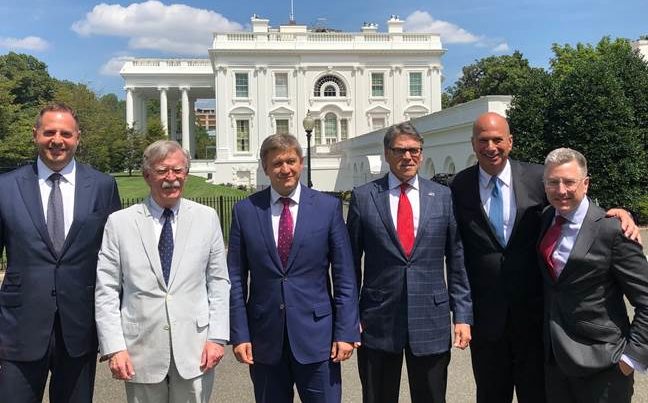Two weeks before President Donald Trump’s infamous phone call in which he pressured the Ukrainian president for political dirt, administration officials applied similar pressure in person to the Ukrainian government — at the White House.
Trump’s now-infamous July 25 call with Ukrainian President Volodymyr Zelensky, during which he pushed the leader to dig up dirt on Democrats, has crowded headlines and cable news commentary for weeks. But the White House gathering two weeks earlier was in many ways a precursor to that call, and is just as important to the emerging story of the White House’s pressure campaign.
The July 10 meeting featured U.S. and Ukrainian national security officials, and, according to witness testimony before Congress, provoked immediate dissent within the administration.
“I am not part of whatever drug deal Sondland and Mulvaney are cooking up,” then-National Security Adviser John Bolton reportedly told a deputy afterward, referring to the White House chief of staff and Gordon Sondland, the administration’s European Union ambassador. Bolton asked that deputy, Fiona Hill, to relay the sentiment to White House lawyers.
The meeting, steps from the White House situation room, was supposed to focus on by-the-book matters of national security cooperation. Ukraine’s National Security Secretary Oleksandr Danylyuk and another top adviser to Zelensky, Andrey Yermak, were in attendance. Then-U.S. Special Envoy to Ukraine Kurt Volker was also there, alongside Bolton, Sondland, Energy Secretary Rick Perry, and Lt. Col. Alexander Vindman, the top Ukraine expert on the National Security Council.
Perry, who’s played an outsized role in Ukraine given his job, wrote on Facebook afterward that the two sides discussed “opportunities for increased energy security cooperation.”
But inside the White House, things grew tense when the Ukrainians brought up the prospect of a meeting between Trump and Zelensky.
It was then that Sondland “started to speak about Ukraine delivering specific investigations in order to secure the meeting with the President,” Vindman later asserted in written testimony. TPM obtained the testimony on Monday, ahead of Vindman’s appearance before the House’s impeachment inquiry.
Hill, Vindman’s superior on the NSC and a Russia specialist, reportedly recalled similar details in her own testimony to Congress earlier this month. She answered questions for about nine hours behind closed doors.
When Bolton was hesitant to commit to a meeting between the presidents, Hill reportedly recalled, Sondland blurted out about an agreement with White House chief of Staff Mick Mulvaney: Ukraine’s president would get his desired meeting if Ukraine pursued the White House’s desired investigations. Like Vindman, Hill recalled that Bolton immediately cut the meeting short.
After Bolton ended the meeting, Sondland asked the Ukrainians to go to another room in the West Wing basement to continue talking, according to multiple reports on Hill’s testimony. Bolton asked Hill to go to that second gathering and report back on what she heard. There, Hill reportedly testified, Sondland spoke with the Ukrainians about Burisma — the Ukrainian gas company that Hunter Biden was on the board of and that Trump and his allies have used as a cudgel against Joe Biden’s presidential bid.
In a debriefing after the Ukrainians departed, Sondland again emphasized the importance of Ukraine delivering investigations “into the 2016 election, the Bidens, and Burisma,” Vindman testified. Vindman objected, and so did Dr. Hill, telling Sondland upon entering the room “that his statements were inappropriate,” Vindman recalled.
For his part, Sondland has explicitly denied that anyone on the NSC — Bolton, Vindman, Hill, or anyone else — “ever expressed any concerns to me about our efforts, any complaints about coordination between State and the NSC, or, most importantly, any concerns that we were acting improperly,” according to his written testimony.
Asked about the clashes between their client’s testimony and others’, Sondland’s lawyers declined to comment in an email to TPM Tuesday.
Hill, Vindman, Sondland and others likely told Congress more behind closed doors about the events on July 10 than has been revealed publicly. The incident, like Trump’s July 25 phone call, is key to the impeachment inquiry’s central question: Did the President use his office to advance his 2020 reelection campaign?
Acting Ambassador to Ukraine Bill Taylor, while not at the meeting, hinted in his written testimony that he’d heard about the gathering from Vindman and Hill.
Taylor was in Ukraine at the time of the gathering, but described what he’d heard second-hand from the NSC staffers on July 19.
“They told me that Ambassador Sondland had connected ‘investigations’ with an Oval Office meeting for President Zelenskyy, which so irritated Ambassador Bolton that he abruptly ended the meeting, telling Dr. Hill and Mr. Vindman that they should have nothing to do with domestic politics,” Taylor wrote.
Taylor said Bolton told Hill and Vindman to “brief the lawyers.” He also mentioned the same phrase that Hill reportedly did in her testimony — that Bolton called Sondland’s arrangement a “drug deal.”
Tierney Sneed contributed reporting.







Amazing! The professionals who took contemporaneous notes provide consistent testimony, while the donor, hack dilettantes veer off into the self-serving wilderness.
Noose is tightening.
When this first broke I was amazed that even Trump could be dumb enough to start another collusion conspiracy the day after Mueller’s testimony, when he had got out from under the scandal that should have ended his presidency. But yeah, he was dumber even than that.
Surely the committees will have Sondland back for an official “correct the record” second chance. And THIS time he’ll be sure to flash that winning smile! Either that or just charge him with perjury.
Social media boasts and posts…what a treasure trove of evidence!
How will we unsee this historic photo?
Like those photos unearthed from the Instagram account of the owners of Fraud Guarantee who are Grenade Giuliani’s clients whom Lock-Him-Up-In-Chief said